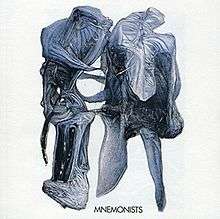Horde (album)
Horde is the third studio album by the free improvisation ensemble Mnemonist Orchestra, released in 1981 by Dys Records.[2]
| Horde | ||||
|---|---|---|---|---|
 | ||||
| Studio album by | ||||
| Released | 1981 | |||
| Recorded | June 1980 – May 1981 | |||
| Studio | Pendragon (Fort Collins, CO) | |||
| Genre | drone, sound collage | |||
| Length | 38:22 | |||
| Label | Dys | |||
| Producer | Mark Derbyshire, Steve Scholbe, William Sharp | |||
| Biota chronology | ||||
| ||||
| Review scores | |
|---|---|
| Source | Rating |
| Allmusic | |
Track listing
| No. | Title | Music | Length |
|---|---|---|---|
| 1. | "Puncture/Throng" | Mark Derbyshire, William Sharp | 3:09 |
| 2. | "Digesting War (In Two Portions)" | Mark Derbyshire, Steve Scholbe, William Sharp | 3:43 |
| 3. | "The Undergrowth" | Sara Thompson | 1:28 |
| 4. | "Resurgence" | Mark Derbyshire, Steve Scholbe, William Sharp, Sara Thompson | 2:24 |
| 5. | "Crucible" | Mark Derbyshire, William Sharp | 2:38 |
| 6. | "The Horde" | Mark Derbyshire, Steve Scholbe, William Sharp, Sara Thompson | 5:01 |
| No. | Title | Music | Length |
|---|---|---|---|
| 1. | "Limbs" | Mark Derbyshire, William Sharp | 3:43 |
| 2. | "Torpor (The Back of a Brain)" | Mark Derbyshire, Steve Scholbe, William Sharp | 3:04 |
| 3. | "A Lingering History" | Mark Derbyshire, William Sharp | 3:50 |
| 4. | "Triptych" | Mark Derbyshire, William Sharp | 9:22 |
Personnel
Adapted from the Horde liner notes.[3]
|
|
Release history
| Region | Date | Label | Format | Catalog |
|---|---|---|---|---|
| United States | 1981 | Dys | LP | DYS 03 |
| United Kingdom | 1984 | Recommended | RR C21 | |
| 1998 | ReR Megacorp | CD | RéR MN1 |
References
- Tilland, William. "The Mnemonists: Horde > Review". Allmusic. Retrieved October 9, 2016.
- Colli, Beppe (March 8, 2005). "An Interview With Bill Sharp/Biota (1994)". CloudsandClocks.net. Retrieved October 9, 2016.
- Horde (sleeve). Mnemonists. Fort Collins, Colorado: Dys Records. 1981.CS1 maint: others (link)
External links
gollark: It is technically possible, but no.
gollark: At this point, books, movies, images and anything else you can put on a computer is (sort of) just an extremely large number.
gollark: Lots of things are just numbers. Some numbers are useful.
gollark: It would be useful if they provided actual real-word TDP numbers, because then laptops maybe wouldn't have quite the same thermal/power issues.
gollark: AMD's CPUs will happily go somewhat over the "TDP" indefinitely, and Intel stuff basically ignores it, especially given that mainboards tend to configure them for "maximum performance regardless of power".
This article is issued from Wikipedia. The text is licensed under Creative Commons - Attribution - Sharealike. Additional terms may apply for the media files.